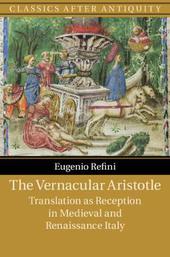
|
The Vernacular Aristotle: Translation as Reception in Medieval and Renaissance Italy
Hardback
Main Details
| Title |
The Vernacular Aristotle: Translation as Reception in Medieval and Renaissance Italy
|
| Authors and Contributors |
By (author) Eugenio Refini
|
| Series | Classics after Antiquity |
|---|
| Physical Properties |
| Format:Hardback | | Pages:292 | | Dimensions(mm): Height 235,Width 159 |
|
| Category/Genre | Literary studies - classical, early and medieval |
|---|
| ISBN/Barcode |
9781108481816
|
| Classifications | Dewey:185 |
|---|
| Audience | | Professional & Vocational | | Postgraduate, Research & Scholarly | |
|---|
| Illustrations |
Worked examples or Exercises; 19 Halftones, black and white
|
|
Publishing Details |
| Publisher |
Cambridge University Press
|
| Imprint |
Cambridge University Press
|
| Publication Date |
27 February 2020 |
| Publication Country |
United Kingdom
|
Description
This book explores the ways in which Aristotle's legacy was appropriated and reshaped by vernacular readers in Medieval and Renaissance Italy. It considers translation in a broad sense, looking at commentaries, compendia, rewritings, and abridgments alongside vernacular versions of Aristotle's works. Translation is thus taken as quintessential to the very notion of reception, with a focus on the dynamics - cultural, social, material - that informed the appropriation and reshaping of the 'master of those who know' on the part of vernacular readers between 1250 and 1500. By looking at the proactive and transformative nature of reception, this book challenges traditional narratives about the period and identifies the theory and practice of translation as a liminal space that facilitated the interaction between lay readers and the academic context while fostering the legitimation of the vernacular as a language suitable for philosophical discourse.
Author Biography
Eugenio Refini is Assistant Professor of Italian Studies at New York University. His interests include Renaissance poetics, rhetoric, and drama; reception of antiquity and translation studies; and the intersections of music and literature. His publications include a monograph on Alessandro Piccolomini titled Per via d'annotationi: le glosse inedite di Alessandro Piccolomini all'Ars Poetica di Orazio (2009) and several articles and book chapters on Ludovico Ariosto, Torquato Tasso, Latin humanism and the musical culture of early modern Italy.
Reviews'This book provides an excellent case-study both for the dividends reaped from paying close attention to how the classics were read in the later medieval period and how failure to pay attention to this material risks distorting our understanding of the Renaissance.' Justin Stover, Bryn Mawr Classical Review 'Scholars of the Renaissance and medieval period, of the history of philosophy, and of the history of the book and of literacy will prize Refini's immensely learned volume. It is equally valuable to literary scholars focused on the practice of reception and on translation, both of which are essential to scholarly interrogation of cultural continuity and discontinuity from the ancient to the modern periods.' Brenda Deen Schildgen, Speculum: A Journal of Medieval Studies
|